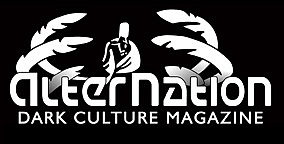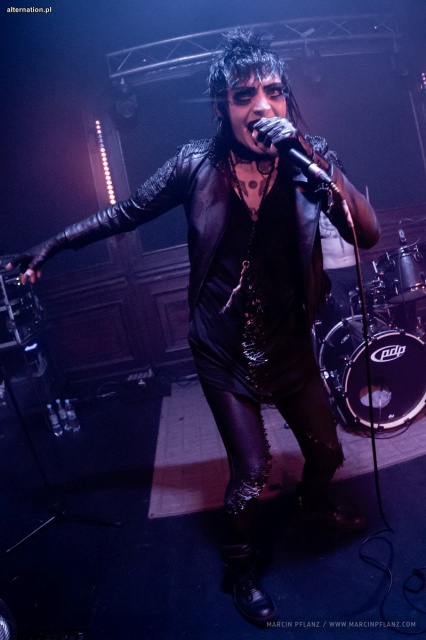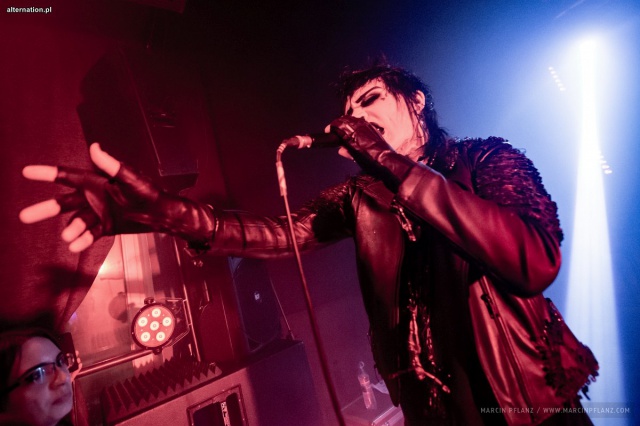Psyclon Nine
Discography:
Last topics on forum:
See photos:
Similar artists:
- 2025 - And Then Oblivion CD,Digital album,Vinyl
- 2025 - Devils Work CDS Digital album
- 2024 - I Choose Violence CDS,Digital album
- 2022 - Less To Heaven CDS,Digital album
- 2022 - Money And Sex And Death CDS Digital album
- 2018 - Icon of the Adversary CD
- 2014 - Use Once and Destroy CDS,Digital album
- 2014 - [Disorder: The Shadow Sessions] CD
- 2013 - [Order of the Shadow : Act I] CD,Digital album
- 2009 - We the Fallen CD
- 2006 - Crwn Thy Frnicatr CD
- 2005 - Inri CD
- 2003 - Divine Infekt
Last topics on forum:
- Psyclon Nine - 2011-07-04
See photos:
- Psyclon Nine + H.Exe + Her Own World - 2024-05-20 (Concerts)
- Wave Gotik Treffen 2007 - 2007-05-29 (Festivals)
Similar artists:
- A7ie
- Acylum
- Aesthetic Perfection
- Agonoize
- Aktive.Hate
- Alien Vampires
- Amduscia
- C-Lekktor
- Combichrist
- Cygnosic
- Dawn Of Ashes
- Die Sektor
- Dope Stars Inc.
- ESC
- FGFC820
- Freakangel
- God Module
- Grendel
- H.Exe
- Hocico
- Life Cried
- Mortiis
- Nachtmahr
- PreEmptive Strike 0.1
- Project Silence
- Siva Six
- Suicide Commando
- Tamtrum
- Unter Null
- Velvet Acid Christ
- X-Fusion
- Xentrifuge
Country:
San Francisko /United States
Date of establishing :
2000
Music genere:
Aggrotech, dark electro, ebm, industrial
WWW:
https://psyclonnine.com/
https://www.facebook.com/psyclonnineofficial/?locale=pl_PL
Initially rooted in the solitary world of digital composition, Psyclon Nine began as Bellum’s personal vehicle, one marked by an obsessive attention to sonic texture and lyrical extremity. His early compositions bore the hallmarks of harsh EBM and aggrotech—high-BPM drum programming, heavily distorted vocals, and religiously charged lyrics—before gradually incorporating more guitar-driven arrangements and metal sensibilities. As the project expanded beyond its studio origins, Psyclon Nine evolved into a full touring ensemble, with a rotating lineup shaped by the demands of live performance and the transient nature of the industrial scene itself.
By 2025, the band remains synonymous with Bellum, who continues to act as its central creative force—handling vocals, programming, guitars, and production with singular control. While live configurations have featured musicians such as Rotny Ford, Jon Siren, and Vlixx, these collaborators have functioned as satellites orbiting Bellum’s creative nucleus. The project’s continuity has been maintained not through stability of personnel, but through the unwavering clarity of its vision—a bleak, cathartic amalgam of sound and ideology that has resisted dilution or compromise across a tumultuous career.
Psyclon Nine’s sonic evolution reflects a deliberate trajectory from digital aggression to atmospheric devastation, mirroring the personal and philosophical shifts of its creator. The band’s earliest releases, including the 2003 debut ‘Divine Infekt,’ were deeply entrenched in the mechanised ferocity of harsh EBM and aggrotech—a subcultural offshoot of electronic body music defined by distorted vocal delivery, relentless sequencing, and club-oriented tempos. Within this framework, Nero Bellum established a reputation for invoking religious blasphemy, internal torment, and technological dystopia with a kind of militant precision, crafting tracks as abrasive as they were cathartic.
Over time, Psyclon Nine’s sound matured into something far more expansive and volatile. Albums such as ‘We the Fallen’ (2009) and ‘Order of the Shadow: Act I’ (2013) marked a distinct pivot toward industrial metal, integrating down-tuned guitars, blackened atmospheres, and slower, more cinematic arrangements. These works drew heavily from the sonic vocabulary of black metal and gothic ambient textures, resulting in compositions that replaced rhythmic immediacy with psychological weight. While the digital scaffolding remained intact, it was increasingly subsumed by walls of distortion, theatrical orchestration, and moments of almost liturgical despair. This shift did not abandon the band’s core themes—it magnified them. Bellum’s preoccupation with decay, sacrilege, and existential disillusionment found new resonance in a sonic landscape that felt both scorched and sacred.
The band’s aesthetic sensibility bears the imprint of its influences, which range from the claustrophobic paranoia of Skinny Puppy to the transgressive drama of Nine Inch Nails and the nihilistic extremity of early black metal pioneers such as Mayhem and Burzum. Yet Bellum’s approach diverges in its deeply personal dimension. His lyrics, visual art, and production choices are informed as much by his own philosophical crises and psychological ruptures as by any genre conventions. Psyclon Nine’s catalogue reads less like a progression of albums and more like a series of sonic exorcisms—each one a meticulous rendering of inner collapse, rendered through a blend of synthetic violence and ritualistic atmosphere that remains defiantly singular within the industrial canon.
San Francisko /United States
Date of establishing :
2000
Music genere:
Aggrotech, dark electro, ebm, industrial
WWW:
https://psyclonnine.com/
https://www.facebook.com/psyclonnineofficial/?locale=pl_PL
Band members:
Marshall Goppert aka Nero BellumBiography:
The project took shape in 2000, its name deliberately contorted from “Zyklon B,” the cyanide-based gas infamously used in Nazi concentration camps. This provocative nomenclature was not intended as endorsement but as a stark act of subversion, forcing audiences to confront the darkest perversions of human history while reflecting the band’s core themes of institutional violence, spiritual ruin, and the mechanics of control.Initially rooted in the solitary world of digital composition, Psyclon Nine began as Bellum’s personal vehicle, one marked by an obsessive attention to sonic texture and lyrical extremity. His early compositions bore the hallmarks of harsh EBM and aggrotech—high-BPM drum programming, heavily distorted vocals, and religiously charged lyrics—before gradually incorporating more guitar-driven arrangements and metal sensibilities. As the project expanded beyond its studio origins, Psyclon Nine evolved into a full touring ensemble, with a rotating lineup shaped by the demands of live performance and the transient nature of the industrial scene itself.
By 2025, the band remains synonymous with Bellum, who continues to act as its central creative force—handling vocals, programming, guitars, and production with singular control. While live configurations have featured musicians such as Rotny Ford, Jon Siren, and Vlixx, these collaborators have functioned as satellites orbiting Bellum’s creative nucleus. The project’s continuity has been maintained not through stability of personnel, but through the unwavering clarity of its vision—a bleak, cathartic amalgam of sound and ideology that has resisted dilution or compromise across a tumultuous career.
Psyclon Nine’s sonic evolution reflects a deliberate trajectory from digital aggression to atmospheric devastation, mirroring the personal and philosophical shifts of its creator. The band’s earliest releases, including the 2003 debut ‘Divine Infekt,’ were deeply entrenched in the mechanised ferocity of harsh EBM and aggrotech—a subcultural offshoot of electronic body music defined by distorted vocal delivery, relentless sequencing, and club-oriented tempos. Within this framework, Nero Bellum established a reputation for invoking religious blasphemy, internal torment, and technological dystopia with a kind of militant precision, crafting tracks as abrasive as they were cathartic.
Over time, Psyclon Nine’s sound matured into something far more expansive and volatile. Albums such as ‘We the Fallen’ (2009) and ‘Order of the Shadow: Act I’ (2013) marked a distinct pivot toward industrial metal, integrating down-tuned guitars, blackened atmospheres, and slower, more cinematic arrangements. These works drew heavily from the sonic vocabulary of black metal and gothic ambient textures, resulting in compositions that replaced rhythmic immediacy with psychological weight. While the digital scaffolding remained intact, it was increasingly subsumed by walls of distortion, theatrical orchestration, and moments of almost liturgical despair. This shift did not abandon the band’s core themes—it magnified them. Bellum’s preoccupation with decay, sacrilege, and existential disillusionment found new resonance in a sonic landscape that felt both scorched and sacred.
The band’s aesthetic sensibility bears the imprint of its influences, which range from the claustrophobic paranoia of Skinny Puppy to the transgressive drama of Nine Inch Nails and the nihilistic extremity of early black metal pioneers such as Mayhem and Burzum. Yet Bellum’s approach diverges in its deeply personal dimension. His lyrics, visual art, and production choices are informed as much by his own philosophical crises and psychological ruptures as by any genre conventions. Psyclon Nine’s catalogue reads less like a progression of albums and more like a series of sonic exorcisms—each one a meticulous rendering of inner collapse, rendered through a blend of synthetic violence and ritualistic atmosphere that remains defiantly singular within the industrial canon.


